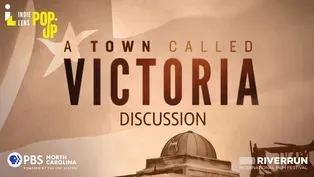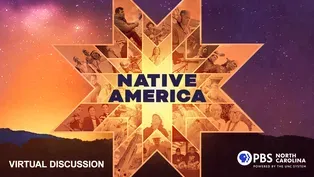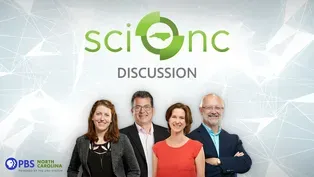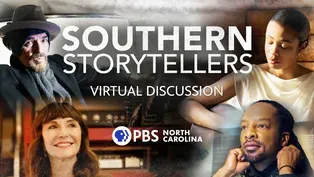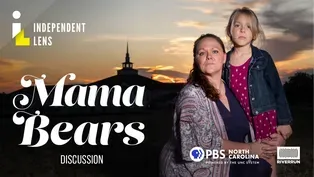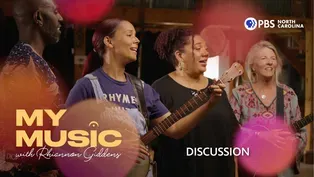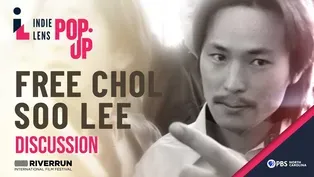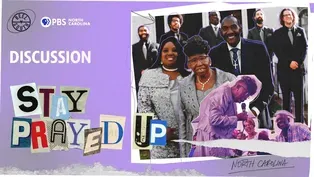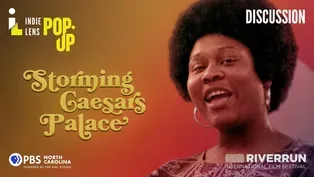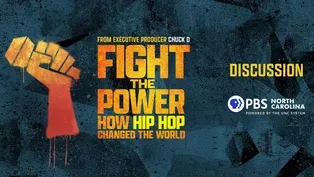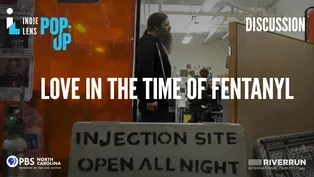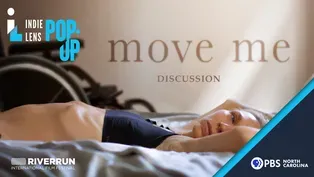PBS North Carolina Specials
Discussion | Philly DA Independent Lens Preview
4/6/2021 | 48m 28sVideo has Closed Captions
Discussing the criminal legal system and prosecutorial reform.
Following the preview screening of Philly D.A. from Independent Lens, PBS North Carolina's Deborah Holt Noel moderated a discussion on the criminal legal system, prosecutorial reform and social justice and equality.
PBS North Carolina Specials
Discussion | Philly DA Independent Lens Preview
4/6/2021 | 48m 28sVideo has Closed Captions
Following the preview screening of Philly D.A. from Independent Lens, PBS North Carolina's Deborah Holt Noel moderated a discussion on the criminal legal system, prosecutorial reform and social justice and equality.
How to Watch PBS North Carolina Specials
PBS North Carolina Specials is available to stream on pbs.org and the free PBS App, available on iPhone, Apple TV, Android TV, Android smartphones, Amazon Fire TV, Amazon Fire Tablet, Roku, Samsung Smart TV, and Vizio.
Providing Support for PBS.org
Learn Moreabout PBS online sponsorshipMore from This Collection
Discussion - A Town Called Victoria - Independent Lens
Video has Closed Captions
The filmmaker and former Victoria residents share their story. (46m 51s)
Discussion - Native America Season 2
Video has Closed Captions
Panelists discuss preserving the languages of Native American tribes. (39m 1s)
Video has Closed Captions
Sci NC executive producer and host, Frank Graff, chats about upcoming Season 6 of Sci NC. (26m 6s)
Discussion - Southern Storytellers
Video has Closed Captions
Author David Joy and others discuss storytelling and their new PBS series. (42m 13s)
Discussion - Mama Bears | Independent Lens
Video has Closed Captions
Producer and director Daresha Kyi discusses the film and LGBTQIA+ advocacy. (34m 41s)
Discussion - My Music with Rhiannon Giddens
Video has Closed Captions
Discussing the series with producers Will & Deni McIntyre and country artist Rissi Palmer. (39m 56s)
Discussion - Free Chol Soo Lee | Independent Lens
Video has Closed Captions
Local lawyers, professors and nonprofit leaders discuss wrongful convictions and reentry. (40m 44s)
Discussion - Stay Prayed Up, Reel South
Video has Closed Captions
The filmmakers discuss their journey with Mother Perry and The Branchettes. (45m 4s)
Discussion - Storming Caesars Palace | Independent Lens
Video has Closed Captions
Local professors and nonprofit leaders discuss welfare and the social safety net. (33m 2s)
Discussion - Fight the Power: How Hip Hop Changed the World
Video has Closed Captions
Local experts discuss the history of hip hop with PBS North Carolina. (59m 43s)
Discussion - Love in the Time of Fentanyl | Independent Lens
Video has Closed Captions
Local harm reductionists, therapists and others discuss the opioid crisis and more. (55m 44s)
Discussion | Independent Lens: Move Me
Video has Closed Captions
A dancer with blindness and disability advocates discuss adaptable arts programs. (38m 46s)
Providing Support for PBS.org
Learn Moreabout PBS online sponsorship- Hello, everyone.
I'm Deborah Holt Noel with PBS North Carolina.
I'm the senior producer and host of Black Issues Forum and North Carolina Weekend.
And I am so excited to welcome you to this screening event and I'm proud to represent one of the largest PBS affiliates in the nation and also content that connects us to our roots as North Carolinians, as Americans, as Southerners.
So welcome to the screening event.
And I would like to also say that the film that you just watched is the fourth film in a series of five Independent Lens films and virtual screening events and discussion events that we have hosted since January.
We are thrilled to have you as a part of this one.
Tonight's film is the first episode of Independent Lens's eight part docu-series, "Philly D.A."
We realize that the impacts of the criminal justice system and police brutality can be traumatic.
We want this conversation and this forum to be a safe space to discuss the criminal legal system, prosecutorial reform, and our community's vision for change.
We all have different experiences and different points of view.
So we're asking that the virtual audience, please be considerate when asking questions or making your comments in the chat.
We may have different perspectives but we can all be civil and respectful.
Now we do have something kind of fun planned on a lighter note.
Filmmakers love to get feedback from their audiences, so we would love for you to text your comments to the number that you saw on the screen earlier and listed in the chat, text phillync to 415-223-8013.
We encourage you to text phillync to 415-223-8013.
And you can do that throughout the discussion and also after the event ends, because we will randomly select two people who participated in the survey to win a $50 gift card to their favorite local bookstore.
So your feedback is invaluable.
They love to get that feedback, we want your questions, and we appreciate your participation in the survey via text.
Again, we really wanna hear what is important to you.
So please use the chat feature to post your questions so that we can get them out to our incredible panel that we have tonight.
And I would like to go ahead and start the conversation by introducing our illustrious panel.
I am excited to be joined by Assistant District Attorney Kendra Montgomery-Blinn of Durham County.
She's also the former executive director of North Carolina Innocence Inquiry Commission.
We also have representative Rick Glazier, executive director of the North Carolina Justice Center and former representative who served 13 years in the North Carolina General Assembly representing Cumberland County.
The North Carolina Justice Center is a nonprofit organization that has a fair chance criminal justice project and has divisions that specialize in consumer housing and energy, immigrant and refugee rights, workers' right, and an NC policy watch division, it's really terrific.
I would also like to welcome Elizabeth Hopkins Thomas that this currently the executive director of the North Carolina Prisoner Legal Services and previously served as a prosecutor in the Durham DA office and led their juvenile team.
And last but not least, we have Mark Rabil, clinical professor of law and director of Innocence and Justice Clinic at Wake Forest University School of Law.
Once again, I'm so pleased to have all of you on our panel.
I'm gonna open up with you though, Rick.
In your work, you have had the opportunity to represent a number of plaintiffs in excessive use of force cases.
And actually one of them, as I understand, was taken all the way to the Supreme Court, set a precedent, and has connections to the Fourth Amendment.
Can you talk about that case, Graham versus Connor and the Fourth Amendment implications - I can, and thank you, again, for allowing us to participate this evening, and for your kind comments about the justice center.
Interestingly, the first case I took in private practice when I got out of a public job that I was in was to file a cert petition to the US Supreme Court in Graham versus Connor, and they accepted that certiorari petition at the Supreme Court.
And that case was then argued by myself and my partner, Gerry Beaver, at the Supreme Court.
And the issue in Graham versus Connor, which came out of Charlotte, was whether or not the law at that time indicated that in order to prove that there was excessive use of force by law enforcement officials, you had to prove that they acted maliciously and sadistically.
And we thought that was a harsh standard and an inappropriate standard, and that the real standard under the Fourth Amendment was, did they act unreasonably?
Did they unreasonably seize someone?
And unreasonable seizure can occur when excessive force is used to effectuate that seizure.
The Supreme Court unanimously agreed, reversed the Fourth Circuit standard and imposed what has been the law ever since, which is when police officers act unreasonably and in violation of the Fourth Amendment, they may face and their units, their departments, may face damages for the harm they inflicted on a citizen.
- So for those who are watching, how did this really change the law for citizens?
- Well, the previous standard had required that in order to take a case like this for civil judgment, you had to prove that the officer maliciously and sadistically intended to hurt the citizen.
That eliminated almost any case.
Most of the time, not all the time, but most of the time, that's a standard you can't meet with proof.
We are certainly seeing cases, including one perhaps happening right now where there was malicious and sadistic behavior.
But in a lot of these cases, it's unreasonable, it's harmful, it's unnecessary.
And it is inflicting damage, not just on the individual that the damage is occurring to, but on the system and on confidence in the system and in communities who see those kinds of actions and they're simply unnecessary.
And when a citizen is hurt, they ought to be able to sue.
And so it opened up a lot more cases for police misconduct review in civil courts throughout the country.
Now there's some limitations on that doctrine, which we can talk about later.
- Thank you so much.
I'd like to bring you in now, Kendra, because you also were involved in a very high profile case.
Many North Carolina will remember, and perhaps, nationwide will remember the case in Chapel Hill where three Muslim students and family members were killed over a parking dispute.
Can you talk a little bit about the bias in that case?
Because today, we're hearing a lot about racial bias in policing, and in the court system, and in the justice system.
But can you talk a little bit about the bias in that case and how you, as a prosecutor, made some positive changes during that trial?
- Sure.
Thank you so much for asking me about that.
It was a notorious case in North Carolina.
A man named Craig Hicks killed three young people in Chapel Hill, the Durham County part of Chapel Hill.
They were Muslims family members.
And the initial narrative when this case came out was that it was about a parking dispute.
That was the narrative that the offender himself had created what he had told to police, and that became the public narrative, but it was not true.
So when Ms. Satana Deberry, the district attorney in Durham, who's has been the DA for a little bit over two years now, when she came into office, she and I took this case on together.
And the first thing that we did was declare it non-capital.
It had been declared a capital case, and that had tied the case for years in litigation.
And so we got that off of the books and got the case back into the court process moving.
So we got it moving by taking the death penalty off of the table.
But as she and I read through the case separately, we actually each took the case file, and read through everything on our own about the case, we both came to the conclusion that this was not a parking dispute, that the murderer had targeted his victims, that he had chosen his victims for what they look like and the clothing that they wore.
And so it was so important to reframe that narrative and that's something that progressive prosecutors do, we tell the truth, even when it's really complicated, even when it's harder than a different narrative.
And so Ms. Deberry looked for an expert in bias, and this is something that the defense has previously done.
It's not been done by prosecutors, an expert in racial bias and implicit bias, and she found Dr. Samuel Summers from Tufts University and we sent him the case to review, and he confirmed what we believe when we were looking at it, that all of these factors played into Craig Hicks choosing his victims, targeting these victims.
And so it was incredibly important for us to tell this in court.
And we had to fight, we had to litigate in order to be able to present Dr. Summer's testimony in court, and to be able to present this evidence, but it was really important to us and to the families to rewrite that narrative, to tell the truth, to tell the whole truth, even when it's complicated.
And I think it matters because we are looking at the shootings this year in Atlanta in the Asian spas.
And I'm watching that narrative unfold in a much the same way the narrative unfolded here, and it's really important for prosecutors to tell the truth even when it's hard, even when they don't understand it.
- That's really key that would even be an issue to tell the truth.
You would think that that's a given.
Why is it so difficult as a prosecutor to tell the truth?
- The truth is complicated.
We are not always required to tell the truth.
You don't have to prove motive in a murder case.
You're not required to prove motive for a jury to convict.
And so sometimes, it's easier for the court system to keep it very simple.
Keep the facts, just stick to the facts, "Just stick to the facts, ma'am," right, we've heard that.
to keep it as simple as we can, but that does a disservice to all who are affected by the criminal justice system, by crime.
We're simplifying the story.
And I did innocence work for years and that's where I learned that in messy and complicated truth is more important than anything else because when we simplify the narrative, we can get it wrong.
- Wow, that is so, so, so helpful and insightful.
Mark, I wanna bring you in as a person who works in academia.
There's a lot of talk about the presence of racial bias in the criminal justice system.
And I want you to talk about what might be able to happen at the beginning level of criminal justice in the law schools.
What can be taught to law students regarding the current system and institutional patterns?
- I'll give you an example.
So we're talking about Rick's case, the Graham case, which is a major use of force case.
And in that, the Supreme Court talked about how we're not gonna second guess the reasonable actions of police officers.
And I think the language and that goes on in other cases to talk about, these officers are making split-second decisions and we're not gonna second guess those.
And I think in the Floyd trial, I think it was yesterday, when the defense attorney was actually cross-examining the chief of police in the Floyd trial.
It sounded to me like he was reading from the Graham case about not second guessing police officers.
And so we use this lofty language in the law that comes from the Supreme Court, and we use terms like, what's reasonable?
Well, what's reasonable to one person is unreasonable to another.
And a year ago, most people, I think, in the United States would say that what that officer did to Mr. Floyd was reasonable under the law.
Now, that is certainly gonna have different verdict racially from points of view, but it took the Floyd case, and it took the time that people had to pay attention because of this pandemic that we're in for people to actually spend time and pay attention to that to see through what reasonable is.
So reasonable is nothing more than the historical compilation of the biases that have been passed down from generation to generation.
400 years of bias has been passed down into this word, reasonable, within the law.
So with my students, especially when I teach the Fourth Amendment, even a basic traffic stop, we have to get the students to slow down and take a look.
Why did the officer stop that car in the first place?
Was it because of the shape of a face?
Was it because of the area of town?
Was it the time of night?
All of these factors that come in to determine racial bias at the very instant when something happens.
So we've come a long way in terms of looking under the word, reasonable, which is what the law is, we hide behind that term a lot, but there's a lot of implicit bias.
And so I think it's incumbent upon us in the law schools to slow everything down and take a very careful and meticulous look at decision-making.
- It seems that that word, reasonable, I won't even say seems, it certainly is a subjective word.
Like you said, what's reasonable to one is not necessarily reasonable to another.
Is there any work or interest in trying to more clearly define what is meant by reasonable?
Or can you really get caught out there in trying to pinpoint what reasonable means?
- Well, I think we're always gonna be using the term, reasonable.
The difficulty is then creating the policies and the awareness of people.
So I think what we need to do now is break down the biases that go into the decision-makings as to what that is.
And another quick example would be, there's another group and there's a task force that's going on that a lot of people are working on with looking at implicit bias.
For example, what should a jury be told about bias?
Should there be, for example, an explanation before the trial ever starts as to what that even means?
Some people make quick decisions without even thinking about it.
And that goes into the factor of, or the word, reasonable.
Reasonable is basically has been determined by the people in power.
It's a power word and we need to break that down.
- Absolutely, and I just wanna remind our audience that we would love to get your questions.
The chat window, you can send your questions there.
And I wanna remind you also to talk with us by sending your comments, texting them to 415-223-8013.
And what you're going to do is text phillync to 415-223-8013.
Once again, we are gonna be randomly selecting two people to receive a gift card, so go ahead and send those comments through and use the chat window to send the panelists your questions.
We're talking about racial bias, we're talking about changing the narrative or framing narratives, but we're not finished yet, because I wanna bring in Beth.
As the executive director of the North Carolina Prisoner Legal Services, how do you and your organization hope to make change?
What are you working to do?
- Thank you so much for having me.
I'm very excited to be here to discuss this incredibly important matter.
I feel that right now is this perfect time when we have a racial awakening surrounding George Floyd's murder, surrounding Breonna Taylor's murder.
We have coronavirus that has brought new awareness to conditions in our jails and prison, and what the human capital that is being wasted in these institutions, that awareness of the public is at a level now that we have people from all sides, from all backgrounds, from all walks of life, really coming to understand how deeply flawed our criminal justice system is.
And so it is my hope to really highlight the conditions of our prisons, of our jail, but people know how rough they can be, how inhumane they can be, and how little rehabilitation takes place in most of our facilities in the state, and really highlighting what can be done to improve those conditions, and to decrease our incarceration rates throughout the state.
- And I can only imagine that some of your biggest obstacles, and correct me if I'm wrong, are just the myths around what happens inside of prisons.
And also perhaps a lack of empathy for the people who are in prisons who have done a wrong and there might be public sentiment that, well, you're in a place of your own doing.
How difficult is it to do your work when those attitudes are out there?
And what are you trying to do to overcome those hurdles?
- Absolutely, so when we have over 27,000 individuals incarcerated in this state, it is safe to say that almost everyone in the state knows someone that has been incarcerated or is in the system in some way at this point.
So it becomes easier and easier to talk to people about the experiences of people that are incarcerated.
I think the public has a fascination with the criminal justice system now.
The Hollywood had the fascination.
We have "Orange is the New Black".
We have multiple true life jail and prison shows now where people really get to know individuals that are incarcerated and they're humanized through drama as well.
I think that just highlighting the humanity of all of those individuals in prisons and jails is the way to really fight those biases.
I think also looking at data and statistics that show the vast majority of those incarcerated are not incarcerated for violent crimes.
It's a very important thing to point out as well.
I think people like to jump to worst case scenarios and think of murderers and rapists when they think of those incarcerated, that that is not the case for the vast majority of those that are held in prisons.
- That's really helpful to know.
Kendra, I wanna ask you about a term that we hear periodically and it's restorative justice.
Can you share, what do we mean by restorative justice?
And can you explain how maybe it's worked here in our state or what it is that you and your officer doing in the restorative justice category?
- Sure, so restorative justice is one of my favorite topics.
So I will try to be mindful of the time that we have.
Restorative justice is not a new practice.
It's actually a practice that's been around in many cultures and not a part of the European criminal justice system that we have here in the United States, but it's been in many other cultures.
It's an indigenous practice as well.
It's finding healing in a different way.
It's taking the offender, the victim, and the community altogether, and through accountability for the offender, making whole whatever can be made whole for the victim, and then accountability to the community and report back and openness to the community.
It's looking into that circle.
Every case is different.
In a traditional restorative justice model, a facilitator, a trained facilitator would meet with the offender separately and their support system, and the victim separately and their support system, and go back and forth as many times as needed, and everyone would come together in the end in a circle to talk about what they've learned through this process, but it doesn't always have to work that way, and I'm finding, in most cases you have to tailor what is the needs to that particular case.
We have a robust restorative justice program in Durham.
I'm happy to be our informal lead for that program in Durham.
We have been doing, these last few years, we have been doing everything from misdemeanors all the way up to homicides, and it's amazing.
I really think that as we're looking at reforming or transforming the criminal justice system, it's important to figure out what else is out there, instead of just how can we make the system that we have better?
'Cause it's really not broken, it's working exactly how it's supposed to work, which is the problem.
So instead of how can we make it better, what else can we do instead?
And I don't think that any of us have quite that answer of how to get from A to C, we're in B somewhere right now.
But I think that exploring alternatives, like restorative justice is a part of building a new vision.
That would be a part of C. And so you saw it in the video we just watched that there's a restorative justice program in the Philly DA's office that's being led by a mother of somebody who was murdered, and so that's really amazing.
I have been privileged to be a part of many restorative justice cases.
It doesn't always work, but when it does, it's worth every bit of extra time that was spent on that case.
- Wow, thank you so much.
Mark, let me ask you, I'm gonna refer to something that's a central theme in the film, and that is the fact that Larry Krasner made the transition from defense attorney to DA.
And I want you to talk about, as a law professor, do you discuss with your students which way to go?
And you yourself, what kinds of things influence your decision to go either way as a defense attorney or as someone who's like on the line to become DA?
[speaking over each other] - Yeah, this is something that we talk about a lot especially when I get into the clinics, teach the Innocence Clinic.
And just so you know, my background for many decades was as a criminal defense lawyer, capital defendant death penalty cases, and now I do the innocence work with the clinic with the students, which you would think, I mean, it sounds like that I would be promoting all the the criminal defense point of view, but probably that is my bias.
I do try to disclose that bias, that's how I see the world, but I think the system is built around that.
That's why we have to prove cases that somebody is guilty beyond a reasonable doubt, but I try to emphasize with my students in whatever class it is that in terms of the most powerful position in the criminal justice system, that's the prosecutor.
If you wanna do some good, become a prosecutor, but be mindful of where you came from.
So I think of, I've had maybe 250 students go through the innocence and justice clinic, and we work on cases and try to figure out whether people are innocent and we pursue that.
But probably 20 of my students around the United States now are prosecutors.
And what I hope, and I think that they do remember is the lessons of the innocence cases, and that more than 2,700 people have been exonerated, cleared, declared innocent.
And Rick and Kendra have been a huge part of our that in creating the innocence commission and in designing and passing laws that have helped promote innocence, but I do think that future prosecutors should be aware of the causes of these wrongful convictions.
Why do innocent people convicted in the first place?
And what we have found from studying the evidence of the 2,700 convictions is that over half have been because evidence was not turned over.
When you get right down to it, evidence has not been turned over.
And so one of the laws that Rick helped pass few years ago was that we now have the right to open discovery.
That means that whatever the reports are, are that they're turned over, and that's what we want prosecutors to remember.
So Krasner comes in as a defense lawyer, and I think that would be hugely, well, criminal defense and plaintiffs work against the police, what a huge change in mindset.
And you can see when watching this film that that is really difficult, although he doesn't seem to have any difficulty with it.
The people around him clearly do, and that's gonna be the challenge.
And that's why I have to make a commercial for the show, but might as well make a commercial for the show.
I'm really curious to see how it turns out.
- So am I.
[laughs] I'll be a commercial for it.
I mean, I've been fascinated by what I've seen so far.
- Yeah, and this is something that I'm gonna have my students watch.
Hopefully, it'll be a made available online, so when they come back, we watch it, because how to become a compassionate, understanding prosecutor and not upset at the fraternal order of police is the challenge.
How to be a good prosecutor and not upset the legislature so that they take away all your discretion is also a huge challenge, we're already seeing that.
I mean, a bill was filed just in the last couple of days to take discretion away from prosecutors in cases where police officers were killed.
And Rick's certainly seeing the other side of that.
I mean, maybe you can ask him about that because taking away the prosecutorial discretion is a huge fear that I have.
- Well, looks like that was a pass to you, Rick.
- Yeah, I mean, I think it's always a challenge for...
I used to remind my colleagues in the legislature that we actually made law, so we ought to think about the legal implications of what we were doing.
And legislators like everyone in the system that we're talking about, whether they are arresting officers, investigating officers, district attorney's offices, jurors, judges, we're all human beings, and that means we're also all fallible, we make mistakes.
And so the system has to have checks and balances within it, which is what the actual Innocence Inquiry Commission was set up to do that Kendra exceptionally well led at its initial first few years.
And legislators also have to learn to think outside the cultural lens that they exist in, that they grew up in.
That's what makes good legislatures, that's what makes good product.
And in that regard, our legislature actually in a period of 2000 to 2010 did a lot of reform.
We created Eyewitness Identification Reform that was top of the line in the country, modeled after a reform in Illinois, by then a very not well-known junior state senator named Barack Obama.
We created videotaping and audio taping of interrogations in most felony cases.
We created much more easily accessible ability to get defendants to DNA and biological evidence.
We enhanced capacity in wrongful conviction cases.
And the actual innocence inquiry commission, which was created, was an understanding that there is no legitimate penological interest that's fostered no societal goal that's enhanced by locking up the wrong person and letting the real perpetrator go free.
It's justice betrayed for the defendant, justice betrayed for the victim, justice betrayed for society.
And so you can have legislatures that understand that and move in that direction, but you can also have legislatures that seek to take an anecdotal story.
And because they don't like a particular outcome, the fear that Mark has, which is real, and so they try to create a full policy restriction because of one particular outcome.
But discretion utilized well is not a bad thing.
It really has to happen just as Kendra pointed out and it's happening in Durham.
Think of what would happen if we took away that discretion.
And so I think it's a question of educating legislators, talking with them, making them see not only the data, but the people behind that data and the impact, as Kendra said, on the communities and consequences of it.
- Well stated, I'm gonna plug one more time our interest in hearing from the audience, people who saw the screener, we'd really love for you to text your comments.
Text phillync to 415-223-8013.
That's the audience survey you can text to phillync, or rather, text phillync to 415-223-8013 throughout this discussion, and also afterwards.
We are gonna be randomly selecting two people who participated in the survey to win a $50 gift card to their favorite local bookstore, so that feedback is invaluable.
Please send your text phillync to this number 415-223-8013 so that you can participate and so that we know what it is that you're interested in hearing about.
I know what some of your questions are already.
We got them in our chat, and I'm gonna share one of them.
And I think this one would be good for Kendra and also Beth.
The question is, what are some of the ways that a prosecutor can combat mass incarceration?
I think it goes along with this other question, has anything been proven to work?
How do you strike a balance with not incarcerating, but still keeping the community safe?
So maybe we'll start with Beth, and then Kendra, if you don't mind.
- Sure, sure, so I think that there are some very simple and low-hanging fruit answers to policies that prosecutors can enact.
It's pretty easy to decriminalize small levels of marijuana, decriminalize sex crimes, and by sex crimes, I mean, prostitution and johns, than just essentially choosing not to prosecute low-level things is that really good start to decreasing the jail population, decreasing, bringing tremendous amounts of people into the system in the first place, I think, increasing deferral programs, offering diversions up front before people are fully brought into the system is a way to decrease the numbers of people going through.
And yeah, yeah.
I think that the much more- - Some good ways.
- Difficult, difficult questions comes when you're talking about over-incarceration with incredibly long sentences that have only been extended longer and longer as the years pass.
So I think that's a bigger question to ask.
- That's really a shame, when you find out about somebody who's done something that may have been heinous in their teen years, and they've just essentially thrown their lives away.
Kendra, can you talk about some things that have worked?
I love that you said that what we currently have isn't working and that we're in B.
So I wanted to know more about this B stage and things that are working.
- Yeah, that's right.
We don't know what C looks like yet, but we're in B, and we're hoping that some of the things in B inspire C, right?
So the A was the current system or the system as it's been, B is the progressive prosecution movement, C is the city on the hill, the shining city on the hill, whatever it will be.
Some of the things that Satana Deberry has done in Durham since she was elected in the past two years have been about shrinking the footprint of the criminal justice system and the role of the prosecutor.
So one of the things that she really changed in the mindset for prosecutors because I've been a prosecutor before under other district attorneys as well, and so this was a new mindset for me was we don't need to handle something in the criminal justice system if it can be handled through another institution or agency.
So we don't prosecute cases that DSS can handle because somebody just needs parenting classes or small claims court can handle because rental property wasn't returned.
We don't involve ourselves now, knowing how much of an impact being involved in the criminal justice system has on somebody.
If another agency can do it, they can do it better, hands-off for us.
So that's been a real change in the mindset.
Of course, the film talked about bail bonds and the cash bond policy, and that was something that Ms. Deberry really ran on during her election, and she's made huge changes, and our office has worked really hard.
She created a new bail bond policy that we're following in Durham.
And today, the jail population is down 20% than it was prior to her election.
And COVID, one of the good things that came from COVID was that that helped the rest of the people come on board with saying, "Wait, why are all of these people in jail?"
And so that was helpful.
Our jail is now in Durham County at half capacity for Durham County inmates, so they now have space.
They take some federal inmates since we made space for them, but it it's at half capacity.
So that's really big and that's really important.
That focus has been on non-violent lower level offenses.
We are still holding people on high bonds in homicide cases where we believe that it's not safe for them to be out in the community awaiting trial or domestic violence cases or sexual assault cases.
So we still are certainly focusing on prosecuting violent crimes, but we're shifting some of the resources from non-violent crimes, lower level crimes, so that we can really focus on the cases that are hurting our community and making our community not safe.
We received a grant for testing of old sexual assault kits and we've been putting more resources into those cases for serial rapists.
That's the kinds of things that the community in Durham is telling us they want us to focus our resources on.
- Deborah, can I add something?
- [Deborah] Please do.
- This is a, and it ties into the other question as well, but there's a bill pending, a bipartisan bill pending in the legislature, one out of the Senate, one out of the House that's really important to think about this restriction at the start of the potential criminal justice process.
And that is to get six, seven, eight, and nine-year-olds out of juvenile delinquency court.
I think the quote was made that if a kid is still thinking about the tooth fairy, it's hard to see that child having a mens rea of a criminal intent and being prosecuted as a criminal effectively in juvenile delinquency.
This is a really important bipartisan bill and will create much more family-based services, and counseling, and capacity through the Department of Health and Human Resources and move these children away from a record that really starts, and a system that really starts when you're six, seven, eight, and nine-year-olds being prosecuted.
And this is something, Beth, I know worked on.
I know that Marcia Morey, a former district court judge in Durham has been a lead on, but it is an example of what you're talking about at the beginning of what could be a pipeline problem.
- Here's a fun question from our chat.
It asks, how do the panelists feel about the reality of changing the system from within?
Is this possible?
Can you keep the promises you made once you're elected and become the man, the DA?
So maybe I start with you, Rick.
- Yeah, it's a good question.
We'll wait to see what happens in Philadelphia, as Mark says, and we'll see how that works out.
But I do believe that you can.
I think change comes in multiple ways and one of the ways has to be from enlightened and shifting cultures and resources and mindsets within systems.
There is no question that the criminal justice system in North Carolina suffers deeply and has for several, many decades, really since inception from systemic inequality.
But the kinds of things we were talking about tonight are ways to get at that, whether that inequality affects charging decisions, arresting decisions, investigative decisions, plea decision, sentencing decisions, or as we've talked about earlier, and as the film talks about, is shifting of resources away from the criminal justice system into all of those systems that if there is money utilized to better improve the public education system, to better improve, and make sure that people have secure and safe housing, to make sure that they have healthcare access.
Those are the things that lift people out of poverty, that lift people into conditions that give them hope and capacity and productivity, and that will in the end be the way to move us out of many of the system inequalities that find their way to the doorstep of the criminal justice system as well as things within the criminal justice system that have to improve.
- Wow, it seems like what you're describing is defund the police, even though that expression is very inflammatory but- - No, I mean, and I don't like the expression because it is, because it doesn't have to be, because actually, we ought to be putting more money into training, more money into paying people to be better officers, to get better quality and stay quality, to be better supervisors, that's really important.
But police officers also shouldn't to be all the other things we asked them to be when we have social workers, we have guidance counselors, we have therapists, we have people who can really work with individuals and families in a holistic way.
And so it's really figuring out, again, as Kendra and Beth and Mark had pointed out, where everybody's job is to help people in the end, and it's not all sitting in the criminal justice system.
- No, and Beth, I wanna bring you in, seemed like you wanted to make a comment on that, too.
- Yes, yes, I would just say that it absolutely is possible to run on these progressive platforms and to see them through.
It takes great strength of character and courage to be steadfast in it, but I think Durham is a perfect example of that.
I would say, to really look at people's platforms as they're running, I think, that progressive prosecutor label is becoming quite popular that you really need to look and see what their actual platforms contain.
Are they against the death penalty?
What are they saying about cash bail and bond and decriminalization of low level offenses?
Definitely, that your candidates is one of the most important elected officials that everyone has, and it's a very important race in every jurisdiction here.
- Well, I think that we are gonna need to wrap up.
Would you believe that our time is just about done?
I really wanted to get a question out there about COVID and what's happening in the prison system.
If you can just provide a brief update on the health of prisoners during the time of COVID and what's happening there, Beth?
- Sure, sure, there was recently a settlement mediation agreement and COVID litigation that provides for the release of 2,500 of our state prisoners to decrease overcrowding, such that prisoners can be socially distanced and stay healthy.
COVID has run rampant throughout the prisons throughout the state, and we've lost upwards of 45 people to COVID within the prisons, inmates from COVID, now that the vaccine is starting to be rolled out within the prisons so we're very hopeful that our clients will be vaccinated and that there'll be safer as the numbers continue to decrease.
And I think also on the front end of cases, quite a few jurisdictions have really looked at who they were incarcerating who they were putting in jail, and if that was necessary for public safety and have decreased the number.
Like Kendra said, Durham has that have helped alleviate the danger within the prisons.
- Well, with that, I'd like to go ahead and wrap us up.
I wish we could take a few more comments, but I wanna make sure that I say thank you to each of our panelists who participated, Kendra Montgomery-Blinn, Representative Rick Glazier, Elizabeth Hopkins Thomas, and Mark Rabil.
We really appreciate your insights.
There are so many questions still in the chat that we need to and would love to be able to get to, but I think that that's a good problem to have.
And lastly, I will remind our viewers once again to text phillync to 415-223-8013 to participate in the survey.
We're going to be picking randomly two participants of the survey to receive a gift card, a $50 gift card to a bookstore of your choice, so be sure to respond, and just very importantly, we just wanna know what you think.
Your feedback means the world who are our folks who are creating all of this fantastic content.
So thank you panelists, thank you audience for joining us, and a very special thank you to ITVS for grant support for making this event possible, and thank you to our event partners.
Thank you to the State Library of North Carolina.
This week is National Library Week, free public libraries are in all 100 counties in North Carolina.
Please celebrate National Library Week by visiting your local library in-person or online.
Happy National Library Week.
Thank you also to RiverRun International Film Festival, RiverRun's annual film festival runs from May 6th through May 16th.
And "Philly D.A."
Premiers Tuesday, April 20th at 9:00 PM on PBS NC, your local PBS station, and streaming on the PBS app.
Tell your friends and neighbors now about "Philly D.A."
It's an eight part docu-series, that's gonna be airing on Tuesday evenings beginning April 20th and it will be available on Passport for those of you who want to watch it at your leisure, and let them know that you saw it here first on PBS North Carolina.
Please be on the lookout for an email early next week with a link for a recording of this discussion, additional resources, and the texting survey information along with upcoming event information.
We, and especially the filmmakers, appreciate your feedback and welcome your comments.
If you enjoy "Philly D.A."
and our conversation, please join us next month, Tuesday, May 4th, for our next screening and discussion event, a conversation with Durham District Attorney Satana Deberry, she, or you, will view a docu-short chronicling Deberry's journey.
We mentioned her a little bit earlier in this discussion, her journey from the campaign trail to the swearing in ceremony, and you will be able to submit your questions via the chat.
Visit Eventbrite or the PBS NC Events webpage to register.
Finally, I'm Deborah Holt Noel, thank you so much for joining us for this special screening event and have a great night.
